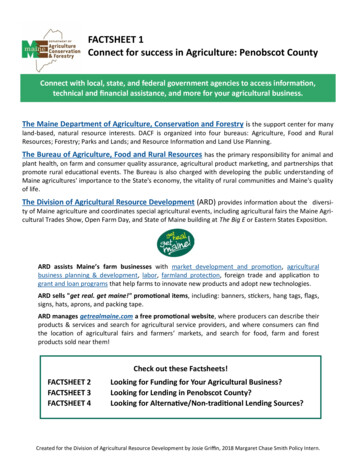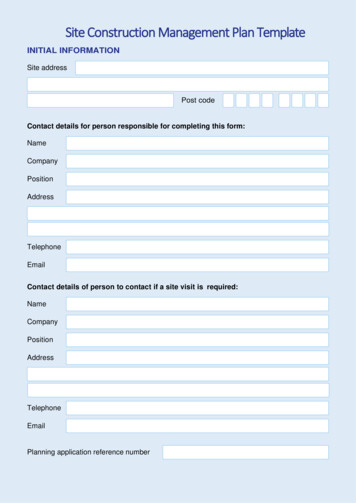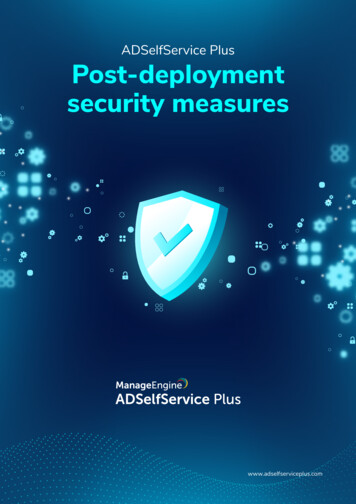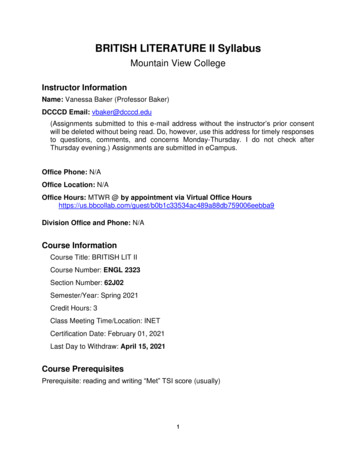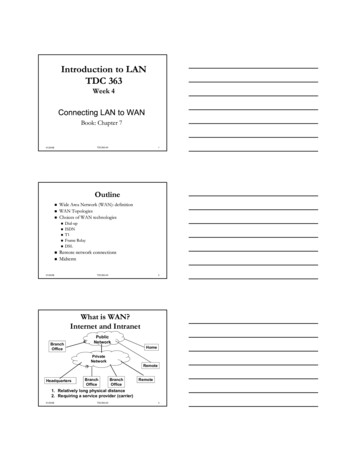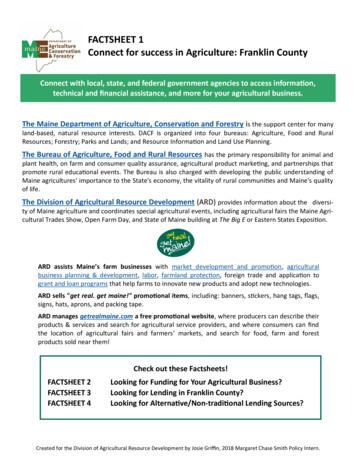
Transcription
FACTSHEET 1Connect for success in Agriculture: Franklin CountyConnect with local, state, and federal government agencies to access information,technical and financial assistance, and more for your agricultural business.The Maine Department of Agriculture, Conservation and Forestry is the support center for manyland-based, natural resource interests. DACF is organized into four bureaus: Agriculture, Food and RuralResources; Forestry; Parks and Lands; and Resource Information and Land Use Planning.The Bureau of Agriculture, Food and Rural Resources has the primary responsibility for animal andplant health, on farm and consumer quality assurance, agricultural product marketing, and partnerships thatpromote rural educational events. The Bureau is also charged with developing the public understanding ofMaine agricultures' importance to the State's economy, the vitality of rural communities and Maine's qualityof life.The Division of Agricultural Resource Development (ARD) provides information about the diversity of Maine agriculture and coordinates special agricultural events, including agricultural fairs the Maine Agricultural Trades Show, Open Farm Day, and State of Maine building at The Big E or Eastern States Exposition.ARD assists Maine’s farm businesses with market development and promotion, agriculturalbusiness planning & development, labor, farmland protection, foreign trade and application togrant and loan programs that help farms to innovate new products and adopt new technologies.ARD sells "get real. get maine!" promotional items, including: banners, stickers, hang tags, flags,signs, hats, aprons, and packing tape.ARD manages getrealmaine.com a free promotional website, where producers can describe theirproducts & services and search for agricultural service providers, and where consumers can findthe location of agricultural fairs and farmers’ markets, and search for food, farm and forestproducts sold near them!Check out these Factsheets!FACTSHEET 2FACTSHEET 3FACTSHEET 4Looking for Funding for Your Agricultural Business?Looking for Lending in Franklin County?Looking for Alternative/Non-traditional Lending Sources?Created for the Division of Agricultural Resource Development by Josie Griffin, 2018 Margaret Chase Smith Policy Intern.
KEY GOVERNMENT AGENCY CONTACTS FOR AGRICULTURE IN FRANKLIN COUNTYFranklin County Soil & Water Conservation District107 Park StreetFarmington, ME 04938-5831207-778-4279Rosetta White, District Managerinfo@franklinswcd.orgSTATE of MAINEDept. of Agriculture, Conservation and Forestry22 State House Station207-287-3200Augusta, ME 04333dacf@maine.govBureau of Agriculture, Food & Rural Resources- 287-3491info@getrealmaine.comAgricultural Resource Development - 287-3491Animal and Plant Health - 287-3891Board of Pesticides Control - 287-2731Quality Assurance & Regulations Quality - 287-3841University of Maine Cooperative Extension138 Pleasant Street, Suite 1207-778-4650Farmington, ME 04938-5828Lani Carlson, AgrAbility Project Coordinatorleilani.carlson@maine.eduDavid Fuller, Agriculture & Non-Timber ForestProducts Extension Professionaldfuller@maine.eduMaine Small Business Development CentersMaine SBDC at AVCOG207-783-9186125 Manley RoadAuburn, ME 04210Jane Mickeriz, Certified Business Advisorjmickeriz@avcog.orgSCORESCORE Oxford Hills2 Market SquareSouth Paris, ME 04281207-772-1147Stephen Veazey, Certified MentorStephen.veazey@scorevolunteer.orgNew Ventures MaineNVME, Farmington108 Perham Street, Suite #2Farmington, ME 04938-1520Janet Smith, Reg. Manager/WorkforceSpecialist207-778-2757 or janet.smith@maine.eduFEDERALUnited States Department of AgricultureFarm Service Agency (FSA)107 Park StreetFarmington, ME 04938-5831207-778-2788 x 2Gary Raymond, County Executive Directorgary.raymond@me.usda.govElisabeth Isbister, Farm Loan Managerelisabeth.isbister@me.usda.govNatural Resources Conservation Service(NRCS)107 Park StreetFarmington, ME 04938-1915207-778-4767 x 3Amanda Burton, District Conservationistamanda.burton@me.usda.govJade Gianforte, Soil Conservationistjade.gianforte@me.usda.govRural Development Area Office254 Goddard RoadLewiston, ME 04240-1000207-753-9400 x 5357Bobbi Crooker, Area Directorbobbi.crooker@me.usda.govUS Small Business Administration (SBA)Portland Work Site312 Fore Street, Suite 104Portland, ME 04101207-248-9040Brad Currie, Senior Area ManagerBradley.currie@sba.govOther ResourcesBeginning Farmer Resource Network of MaineDACF Farmer Education and ResourcesMaine Forest ServiceMaine Secretary of State - Small Business ResourcesUSDA’s Education and Assistance for New FarmersDivision of Agriculture Resource Development—State of Maine Department of Agriculture, Conservation & Forestry
FACTSHEET 2Looking for Lending for Your Agricultural Business?Follow these steps to initiate your loan search process!Step One: Learn More About FarmingExperience counts! Whether you are a new or experienced farmer, make time in your lifeto gain new skills. Participating in on-farm workshops and educational courses will increaseyour ability to succeed. Exchanging ideas with peers and industry experts will boost yourimagination too. And, when you introduce yourself to a lender or make your pitch to agroup of investors, your history of participation tells them you are actively maintainingconnections within Maine’s agricultural sector.Step Two: Describe Your ProjectBefore you start looking for funds, sit down and write a statement about what you want todo and why. “ABC Farm will build a new cow barn with a maternity and sick bay manageand improve cow health in order to increase milk production.” This is your purpose statement. Now make detailed list the project elements and approximate costs to achieve yourpurpose. Any potential lender will be more confident and interested in lending to you nowdevelop a written business plan that describes how your project fits into the big picture foryour agricultural business. Contact the Maine Small Business Development Centers, theUnited States Small Business Administration, or SCORE (Factsheet 1) to schedule a meetingwith a certified business advisor to discuss your purpose and develop your plan.Step Three: Start the Loan Search ProcessTo begin your search for lenders, check out Factsheet 3, which lists branch locations offinancial institutions by county and Factsheet 4, which lists alternative or non-traditionallenders. Visit their websites. Schedule appointments and make copies of your businessplan. Consider all of the questions on the back page to prepare for each appointment.Taking these steps before you search out and apply for a loan will not only save you timeand money, it may also help to curb some of the anxieties that borrowing often triggers.Created for the Division of Agricultural Resource Development by Josie Griffin, 2018 Margaret Chase Smith Policy Intern.
These questions point to the Five C’s of Credit: Character, Capital, Capacity, Collateral & Conditions, that all lenders consider.Questions to Ask Yourself when Looking for a Loan1. What type of loan do I need?What is your purpose for the loan? To purchase equipment? Land? Construct a barn? Or is for operating expenses? Do you need a long-term loan or a short-termloan? Being clear about your purpose and loan termswill help you identify the right lender and loan product.2. How much have I invested into my business?What is your business history? When and how much ofyour own money have you invested to establish orgrow your business? Your history of investment andgrowth will build a potential lender’s confidence in youand your business.3. What are the minimum requirements for gettingfinancing?Filing out loan applications is time consuming. Beforeyou start filling out forms, learn which loans yourbusiness or project will be eligible for.4. How much money do I need to borrow?Do you have quotes, estimates and purchase orders inhand? Do you know exactly how much it will cost tofulfill your loan purpose? Some lenders may offer onlylarge loans and others may offer only micro-loans,however all lenders will want to see that you havecarefully considered how the loan figures into yourproject budget and business plan.5. How is my credit?Each lender will likely require you to fill out a personalfinancial statement in addition to your loan application. Your personal and business credit are good indications of how you manage money and how successfulyour business is or may be. It is in your best interest tomaintain good credit and regularly update your personal and professional credit profile.Questions to Ask Your Potential Lender when Looking for a Loan1. Do you have a history of lending to those in theagriculture industry?If your potential lender does not typically lend toagriculture businesses, you may have better luck with adifferent lender that specializes in agriculture lendingor has previous experience with lending to farmers.Check out Factsheet 3 to find financial institutions inyour county. Check out Factsheet 4 to learn more aboutalternative and non-traditional lending sources.3. What is the interest rate and what is the totalinterest cost?What is your debt to income ratio? Can your businessmanage take on additional debt—now or later?Always ask your potential lender to explain the interestrate and total cost (interest principal) of the loan todetermine if taking on debt is a sound and timely businessdecision.4. What will the payment schedule be like?Discuss loan repayment with your potential lender.2. What loan terms do you offer that fit my businessLater, update your business’s projected financialneeds?statements to include this payment schedule.Now that you have matched your purpose and budgetwith a specific loan type, take time to discuss your 5.How long does the loan application process usuallybusiness goals and the loan terms with the potential take?lender. Determine if that lender is the “best fit” for you What is the loan application process and timeline?and your business needs.What steps or costs in the review process should youanticipate and prepare for? Make sure your timeline isin sync with loan application and processing timeline.Division of Agricultural Resource Development—State of Maine Department of Agriculture, Conservation & Forestry
FACTSHEET 3Looking for Lending in Franklin County?Connect with these financial institutions to see if they offer the financing you need for youragricultural business!Some have multiple branch locations within the county, so be sure to check online or here to see if a branch may be closer to you.Savings BanksAndroscoggin Bank6 Androscoggin Lane, Jay, ME 04239(207) 897-4401Bangor Savings Bank177 Main Street, Farmington, ME04938(207) 779-1899Federal Credit UnionsFranklin Somerset Federal CreditUnion485 Wilton Rd, Farmington, ME 04938(207) 778-4452Otis Federal Credit Union170 Main Street, Jay, ME 04239(207) 897-090Franklin Savings Bank197 Main St, Farmington, ME 04938(207) 778-3339Skowhegan Savings Bank134 Hannaford Drive, Farmington, ME04938(207) 778-0302Credit UnionsUniversity Credit Union154 High Street, Farmington, ME04938(207) 778-4011National BanksKeyBank300 Main Street, Wilton, ME 04294(207) 645-2591TD Bank163 Broadway, Farmington, ME, 04938(207) 778-6511Created for the Division of Agricultural Resource Development by Josie Griffin, 2018 Margaret Chase Smith Policy Intern.
Check out the Five C’s of Credit: Character, Capital, Capacity, Collateral, and Conditions during your loan search process!5 Questions to Ask Yourself when Looking for a Loan1. What type of loan do I need?4. How much money do I need to borrow?Is it for equipment purchase? Real estate? Do you need along-term loan or a short-term loan? It’s important toestablish what type of loan you are seeking, as a lendermay be more likely to approve a loan that has a specificpurpose and conditions, rather than a loan that could beused for anything.Lenders like to see that you have carefully consideredyour project’s sources, uses, and the amount of moneyyou’d like to request for your loan. You should aim toborrow exactly what you need to fulfill the purpose ofyour loan. It’s also important to know how much moneyyou need because some lenders only offer large loanswhile others only offer micro-loans.2. How much have I invested into your business?Having your own money invested into your business lookspromising to a potential lender. By having your ownmoney invested in your business, your potential lenderwill see that you’re confident your business will succeed.5. How is my credit?Your business and personal credit are good indications ofhow you manage money and how your business will do inthe future. It’s in your best interest to maintain areputable credit profile for both.3. What are the minimum requirements for gettingfinancing?Knowing what a lender requires from a you to receivefinancing is beneficial because if you know what financingoptions you qualify for, you can spend more time on5 Questions to Ask Your Potential Lender when Looking for a Loan1. Do you have a history of lending to those in the 4. What will the payment schedule be like?agriculture industry?By knowing when you’ll be expected to make yourIf your potential lender does not typically lend to payments beforehand, you’ll be prepared to do so whenagriculture businesses, you may have better luck with a the time comes.different lender that specializes in agriculture lending orhas previous experience with lending to farmers. Checkout Factsheet 3 to find lending sources by county and 5. How long does the loan application process usuallyFactsheet 4 to learn more about alternative lending take?sources.Depending on your project’s purpose and fundingsources and use, you may need a loan with a few days,2. What loan terms do you offer that fit my businessweeks, or months. If your potential lender’s loanneeds?application process takes more than a few weeks and youSince you already have an idea of what you’re looking for, need a loan quickly, you may want to consider approachyou can quickly determine if a lender is right for you ing another lender with a quicker application process.based on the loan terms a lender offers.3. What is the interest rate and what is the total interestcost?By knowing the interest rate and total interest cost ofyour loan, you can determine if the loan is affordable foryour business.Division of Agricultural Resource Development—State of Maine Department of Agriculture, Conservation & Forestry
FACTSHEET 4Looking for Alternative/Non-traditional Lending Sources?Connect with these non-governmental and private organizations that either ionhave experiencewithlending to farmers.Androscoggin Valley Council of GovernmentsOffers loans and microloans to residents inAndroscoggin, Franklin, and Oxford Counties thatcan be used for building improvements, furnitureand fixtures, equipment, inventory, supplies,working capital and/or refinancing debt.Contact:Ed Dox, Loan Officer(207) 783-9186CDC New EnglandOffers SBA 504 loans that can be used forpurchase of land and improvements, including anexisting building, construction of a new facility,modernizing or renovating an existing facility,providing leasehold improvements, purchase ofmachinery and equipment with a minimum usefullife of 10 years, other soft costs associated withany of these projects.Contact:Field Rider, Senior Loan and Investment Officer(207) 773-3104Coastal Enterprises, Inc.Offers business loans that can be used for equipment, property, and working capital, and equityloans. Offers microloans that can be used for smallbusiness or startup costs. Also offers informationand identification of best available capital sources.Contact:Brett Richardson, Director, Sustainable Agricultureand Food Systems(207) 504-5881The Carrot ProjectTrustee for the Kiva crowdlending platform,which enables qualified farmers to apply for 0%interest loans of up to 25,000, grace periods areavailable for agricultural businessesContact:(617) 674-2371info@thecarrotproject.orgEastern Maine Development CorporationOffers direct loans and SBA 504 loans that can beused for working capital, equipment, renovations,expansions, etc.Contact:1-800-339-6389Kennebec Valley Council of GovernmentsOffers loans for residents of Kennebec, westernWaldo, or Somerset County to be used to financestart-ups, expansions, and modernizations.Contact:(207) 453-4258info@kvcog.orgMaine Organic Farmers and GardenersAssociation (MOFGA)Offers an Organic Farmer Loan Fund, which offersloans to small and medium-sized businesses thatare for certified organic, interested intransitioning, or a MOFGA Journeyperson/alumni(who do not need to be organic) who are seekingto expand or enhance their farm or processingoperations through business planning, marketing,aggregation, or other business enhancement.May also be used for working capital orequipment purchases.Contact:Dave Colson, Agricultural Services DirectorCreated for the Division of Agricultural Resource Development by Josie Griffin, 2018 Margaret Chase Smith Policy Intern.
Slow Money MaineMaine Organic Lenders (MOL) and No SmallPotatoes loan funds can provide lending forequipment, working capital, as well for increasingthe processing, marketing and distribution capacities and efficiencies of food businesses.Peer-to-peer Lending enables individuals makeloans directly to food producers.Contact:info@slowmoneymaine.orgSomerset Economic Development CorporationOffers a revolving loan fund that can be used foragricultural needs.Contact:Christian Savage, Executive Director(207) 474-0166Sunrise County Economic CouncilOffers a Sunrise Ag Microloan Fund that may beused for equipment, inventory, material,purchase/improvement; creation and/orexpansion of value-added products/services;training and education, marketing assistance;energy efficiency improvements; and help withstart-up capital.Contact:Susan Hatton, Program Manager(207) 949-0336Whole Foods MarketOffers a Local Producer Loan Program that allowsfarms with an existing vendor relationship withWhole Foods to be eligible for loans that can beused for expansion and capital expenditures (e.g.,buy more animals, invest in new equipment andinfrastructure, or expand crops).Contact:Jenna Gelgand, Local Producer Loan ProgramSenior Program ManagerDivision of Agricultural Resource Development—State of Maine Department of Agriculture, Conservation & Forestry
Skowhegan Savings ank 134 Hannaford Drive, Farmington, ME 04938 (207) 778-0302 redit Unions University redit Union 154 High Street, Farmington, ME 04938 (207) 778-4011 National anks Keyank 300 Main Street, Wilton, ME 04294
